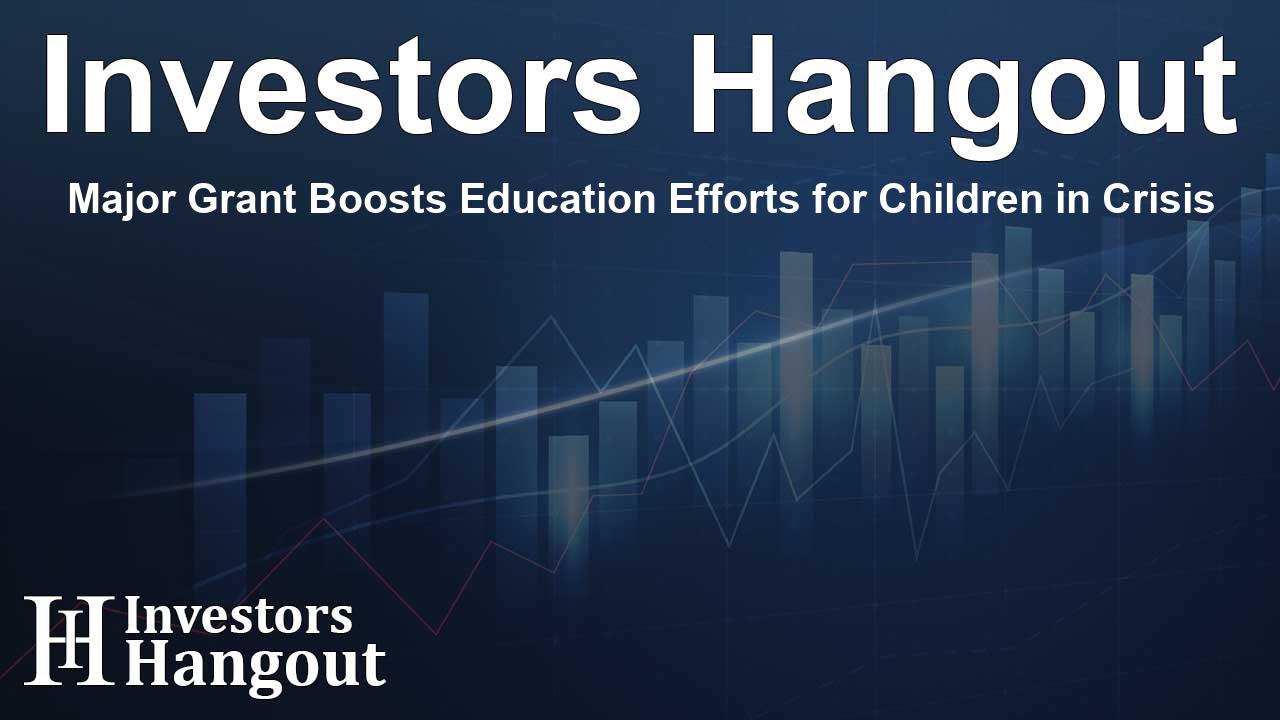Major Grant Boosts Education Efforts for Children in Crisis

Education Cannot Wait's Impactful New Grant in Chad
The expanded grant will be delivered by UNICEF in coordination with local and international partners to respond to growing needs that have left 3.2 million children out of school.
Chad finds itself among the poorest nations globally, with more than a third of its population in dire need of humanitarian assistance. The ongoing conflict in neighboring regions and climate change has exacerbated the situation, leading to increased displacement and disruptions in education for countless children.
The Growing Need for Educational Support
In light of these crises, Education Cannot Wait, often referred to as ECW, has collaborated with strategic partners to unveil a $20 million grant aimed at supporting their Multi-Year Resilience Programme specifically within Chad. This initiative is set to benefit approximately 66,000 children and adolescents affected by ongoing crises.
The crucial funding will be directed through UNICEF in collaboration with the Chad government and various national and international partners. With this latest allocation, the total funding from ECW in Chad exceeds $61 million, positively impacting over 880,000 children by providing safety, hope, and the opportunity for quality education.
Significance of the Catalytic Grant
This catalytic grant is pivotal in addressing the objectives outlined in the Humanitarian Response Plan in Chad, which seeks $28.2 million for education purposes. Alarmingly, approximately 50% of this humanitarian appeal remains unfulfilled, underscoring the urgency of these financial contributions.
Yasmine Sherif, Executive Director of Education Cannot Wait, stressed the need for increased financial backing, stating, "Chad’s commitment to welcoming refugees and incorporating them into its educational framework is commendable. Yet, the demands far exceed current resources, and we must rally support from both public and private sectors to enhance educational access for these vulnerable groups. This is a significant step toward realizing our commitments made at the Global Refugee Forum."
Chad's Educational Challenges
Chad hosts one of the world's largest refugee populations, with over 1.7 million displaced individuals, including 1.2 million refugees. The primary factors contributing to humanitarian needs include forced displacement, food and nutrition crises, and health emergencies, compounded by climate-related challenges.
As refugees continue to arrive from conflict-stricken regions, including neighboring Sudan and the Central African Republic, Chad's resources are increasingly strained. Currently, around 3.2 million children and adolescents find themselves outside the educational system, and those who do attend school often face quality issues influenced by insufficient funding and severe weather disruptions attributed to climate change.
ECW's Response and Future Directions
UNICEF has publicly expressed gratitude for ECW's steadfast support for school-aged children impacted by these multifaceted crises. The second phase of the Multi-Year Resilience Programme aims to guarantee inclusive and quality education. This initiative will specifically target education system resilience in the Ouaddaï and Logone Oriental provinces over the coming years.
Of the aim of helping 66,600 children, over 40% are expected to be refugees. The program will train more than 1,500 teachers in critical areas such as conflict and risk reduction, mental health support, and improved pedagogical methods. It also emphasizes civil registration for children, focuses on vulnerable girls, and provides tailored educational pathways for those with disabilities.
About Education Cannot Wait (ECW)
Education Cannot Wait is recognized as the global fund for education in emergencies, contributing significantly to securing quality education for crisis-affected youths. The mission is straightforward: ensure that no child is left behind, facilitating immediate and long-term educational initiatives through effective multi-year programs.
To achieve this, ECW collaborates with a myriad of partners, including governments, public and private donors, UN agencies, and civil society organizations. There is a pressing need for comprehensive support from both public and private sectors to broaden reach and effectively serve more vulnerable children and youth.
Frequently Asked Questions
What is the total amount of funding provided by ECW in Chad?
As of this new grant announcement, total funding by ECW in Chad exceeds $61 million.
How many children are expected to directly benefit from the new grant?
Approximately 66,000 children and adolescents are expected to benefit from the new $20 million grant.
What challenges currently affect education in Chad?
Challenges include forced displacement, insufficient educational resources, climate emergencies, and high school fees that prevent access.
Who is coordinating the delivery of this grant?
The grant will be managed by UNICEF in collaboration with the Chad government and various national and international partners.
What is ECW's broader mission?
ECW aims to provide quality education in emergencies and crises, ensuring that every child has access to education regardless of their circumstances.
About Investors Hangout
Investors Hangout is a leading online stock forum for financial discussion and learning, offering a wide range of free tools and resources. It draws in traders of all levels, who exchange market knowledge, investigate trading tactics, and keep an eye on industry developments in real time. Featuring financial articles, stock message boards, quotes, charts, company profiles, and live news updates. Through cooperative learning and a wealth of informational resources, it helps users from novices creating their first portfolios to experts honing their techniques. Join Investors Hangout today: https://investorshangout.com/
Disclaimer: The content of this article is solely for general informational purposes only; it does not represent legal, financial, or investment advice. Investors Hangout does not offer financial advice; the author is not a licensed financial advisor. Consult a qualified advisor before making any financial or investment decisions based on this article. The author's interpretation of publicly available data shapes the opinions presented here; as a result, they should not be taken as advice to purchase, sell, or hold any securities mentioned or any other investments. The author does not guarantee the accuracy, completeness, or timeliness of any material, providing it "as is." Information and market conditions may change; past performance is not indicative of future outcomes. If any of the material offered here is inaccurate, please contact us for corrections.